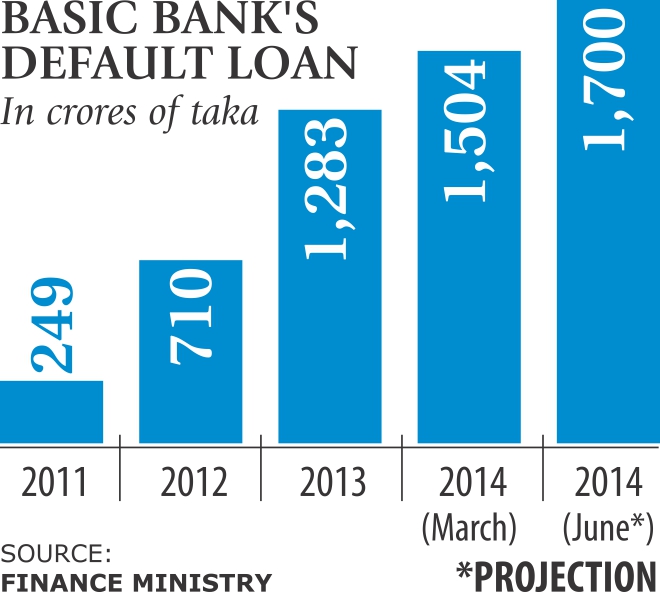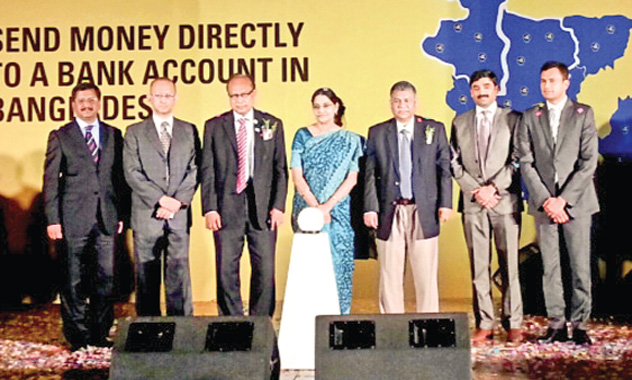BASIC Bank's loan defaults swelling to Tk 1,700cr

BASIC Bank's default loans continue to escalate in the face of irregularities, despite Bangladesh Bank's efforts to keep it in check.
By the end of June, it is forecast to hit Tk 1,700 crore, up 13 percent from March 30, according to a finance ministry report placed in parliament on Thursday.
The figure is 13.45 percent of the state-run scheduled bank's total outstanding loans, and a central bank official tipped the actual figures to be much higher as the bank showed a huge amount of bad loans to be non-classified.
The report also found that the bank's financial condition is worsening by the day, with its capital eroding at an alarming rate.
The minimum capital requirement as per BB's stipulations is 10 percent against the risk-weighted assets, but BASIC's stood at only 4.5 percent at the end of March.
One of the best-run banks till 2009, BASIC has been mired in financial irregularities in recent years, with the bank counting losses—of Tk 43.2 crore—for the first time last year.
Central bank investigations unearthed irregularities involving loans worth around Tk 4,500 crore in the last three years, and on May 29 it advised the government to dissolve the bank's board as the governing body was found to be complicit in the irregularities.
While the BB on May 24 removed the bank's managing director Kazi Faqurul Islam for his failure to check the irregularities, the government is yet to take any action against the main accused, Sheikh Abdul Hye Bacchu, the bank's chairman.
Asked about the lack of action against the chairman of the board, Finance Minister AMA Muhith yesterday said the prime minister's approval is required for it.
However, he said punitive actions are on the way against the bank's board considering the central bank's recommendation.
Asked if the loans given out through irregularities could be recovered, he said: “I don't know.”
The banking regulator also suspended loan activities at three of BASIC'S branches—Dilkusha, Shantinagar and Gulshan—where most of the irregularities took place last year and the year before.
Pubali Bank to appoint two persons with disability every year

Pubali Bank Limited will appoint two persons with disability every year under humanitarian banking programmes.
Board of Directors of the bank has taken the decision to appoint two physically challenged job aspirants every year.
Hafiz Ahmed Mazumder, Chairman, Board of Directors of Pubali Bank informed this while handing over the appointment letters to Sanjida Rahman and Dewan Salamat Raza Chowdhury, two physically challenged job seekers at a ceremony held in Sylhet recently.
Fahim Ahmed Faruk Chowdhury, Vice-Chairman, Board of Directors, Moniruddin Ahmed, and Azizur Rahman, Directors, Helal Ahmed Chowdhury, Managing Director and Abu Habib Khairul Kabir, General Manager of the bank were present.
Ahmed Shafi Choudhury, Director, MA Halim Chowdhury, Additional Managing Director, Safiul Alam Khan Chowdhury, Deputy Managing Director, senior officials of the bank and customers were also present.
WU, Bank Asia Launch D2B NRBs can send money directly thru banks

Western Union Company, a leader in money transfer and global payment service, and Bank Asia, one of the leading banks in Bangladesh introduced Western Union’s Direct-to-Bank (D2B) money transfer service for the first time in Bangladesh.
The new service will allow Bangladeshi expatriates send money to their family members in Bangladesh at any bank account connected to BEFTN (Bangladesh Electronic Funds Transfer Network) from any of Western Union’s participating agent locations across the world.
The service is currently available from Malaysia as a first step and will soon be offered from other countries across the globe, said a press release.
The service was launched at a function in Dhaka recently. Kiran Shetty, Western Union’s Regional Vice President for South Asia, and Md. Mehmood Husain, President and Managing Director of Bank Asia Ltd, were present.
“According to the Bangladesh Bank, remittances sent by Bangladeshis living and working abroad surpassed $14.4 billion during the period August 2012 - July 2013, and represent 10 percent of the country's GDP,” said Western Union’s Regional Vice President for South Asia, Kiran Shetty.
“In such a vibrant country, we at Western Union believe that our task is to extend our services to as many consumers and provide them with more choices in moving money in a reliable and convenient manner. The cooperation between Western Union and Bank Asia will help Non-Resident Bangladeshis send money directly to bank accounts in Bangladesh, facilitating greater access to financial services. We are very happy to join hands with Bank Asia and offer this new service D2B” Shetty continued.
Inflation to remain stable: BB governor
The Bangladesh Bank governor Dr Atiur Rahman on Friday hoped that the country’s inflation rate is like to remain stable as the central bank has an effective monetary policy in place. The current inflation rate is lower than 7 per cent and the central bank dose not foresee any recent rise in inflation, the governor also said while addressing a post budget press conference at Osmani Milonayoton Auditorium in Dhaka. When asked about the government’s plan to borrow Tk 31,121 crore from banks to meet the budget deficit the governor said inflation will not increase because the central bank has enough preparation to face any uncertain situation. The central bank has taken some effective measures to keep the inflation stable. Specially SME, agriculture, and sharecropper’s loan progr-ammes to reduce poverty is helping to keep inflation within the desired limit. He added.
News:The Independent/7-June-2014Euro dips in Asia after ECB easing measures
he euro dipped a touch in Asia on Friday after the European Central Bank launched unprecedented easing measures to bolster fragile eurozone growth and prevent deflation.
The single currency fetched $1.3657 in Tokyo afternoon trade, down from $1.3662 in New York but still up from $1.3600 in Tokyo earlier Thursday.
The euro weakened to 139.76 yen from 139.93 yen, but was also stronger than 139.43 yen in Tokyo prior to the announcement.
The dollar edged down to 102.33 yen from 102.41 yen.
The ECB said after a meeting Thursday it would cut its deposit rate to negative territory. This means banks will be charged for leaving funds at the ECB in the hope they might lend it on to businesses and consumers instead.
It also slashed its lending rate to a record low of 0.15 per cent from 0.25 per cent and said hundreds of billions of euros would be made available in cheap loans to banks as long as they lent more to the private sector.
Bank chief Mario Draghi said after the meeting that policymakers would also be open to possible asset purchases, or quantitative easing, similar to that undertaken in the United States and Japan.
‘The ECB managed to surprise relative to high expectations by delivering a full package of easing measures,’ Credit Agricole said.
‘Any further deterioration in the inflation outlook would likely trigger outright asset purchases.’
The dollar was lower against other Asia-Pacific currencies.
It weakened to 1,019.75 South Korean won from 1,021.48 won, to 43.66 Philippine pesos from 43.82 pesos, to Sg$1.2527 from Sg$1.2573, and to 59.22 Indian rupees from 59.34 rupees.
The US unit also weakened to 11,839 Indonesian rupiah from 11,889 rupiah, to 32.56 Thai baht from 32.68 baht, and to Tw$30.02 against Tw$30.03.
The Australian dollar rose to 93.28 US cents from 92.83 cents while the Chinese yuan was at 16.34 yen against 16.39 yen.



